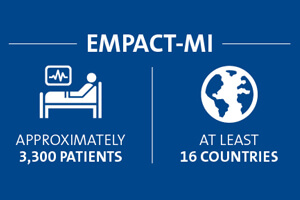Our Thinking
Randomized clinical trials are one of the primary methods to generate evidence that informs care, but there are significant challenges associated with the way these trials have traditionally been done. With high costs and lengthy timelines, many clinical trials are burdensome to investigators, sites, and patients.
Pharmaceutical companies and other organizations need to solve for these problems while maintaining access to high-quality data that lead to valid answers to important questions. The DCRI introduces solutions via pragmatic approaches that are revolutionizing the way clinical trials are conducted. We accomplish this in three main areas: study design, recruitment, and participant-centered research.

"How do we conduct more efficient studies to answer important questions that impact patients?"
Adrian Hernandez, MD, MHS
Executive Director,
Duke Clinical Research Institute
Vice Dean, Duke University School of Medicine
Study Design
Our thought leaders design studies that include pragmatic elements in order to embed research into standard clinical care.
Other innovations we’ve applied to study design include:
- Partially or fully virtual trials
- Participant-friendly informed consent processes
- Integration of real-world data sources, such as electronic health records
Recruitment
By streamlining recruitment, we shorten the enrollment period and recruit a study population that is more representative of patients seen in real-world care.
Other pragmatic approaches we’ve taken to improve study recruitment include:
- Use of electronic health records to rapidly identify large cohorts of potential participants
- Technology solutions such as online patient portals
- Novel recruitment strategies that meet patients where they are
Participant-Centered Research
Pragmatic studies should be participant-centered, answering research questions that impact patients’ lives.
We put participants at the center of our research by:
- Partnering with DCRI Research TogetherTM to ensure that our research meets patients' needs
- Implementing novel engagement strategies to support study retention
- Sharing study results once research is complete
Ensuring Quality Through Expertise
With a range of clinical, statistical, and operational experts on our team, we focus on conducting rigorous studies that produce high-quality, regulatory-compliant data.

Caring for Patients
Our investigators are also practicing clinicians who care for patients regularly, and they bring a deep understanding of clinical challenges to their research.

Diving into Data
Our statistical experts bring their experience with real-world data sources such as electronic health records to integrate data from different sources and clean datasets to make them research-ready.

Implementing Ideas into Action
Our operational leaders, who have vast experience in conducting large, global trials, ensure our studies with pragmatic approaches are supported from protocol design to study's end.
Highlights

COULD A DIABETES DRUG PREVENT HEART FAILURE?
EMPACT-MI, a pragmatic trial conducted by the DCRI in partnership with Boehringer Ingelheim and Eli Lilly, seeks to determine whether empagliflozin, a drug typically used to treat diabetes, could be used to prevent heart failure after a heart attack.

A PRAGMATIC DESIGN TO INCREASE TRIAL ENROLLMENT RATES
Robert Mentz, MD, discusses features of pragmatic heart failure trial TRANSFORM-HF with a representative from the trial's sponsor, as well as considerations for how pragmatic clinical trials will be conducted as they continue to gain importance.

RECOMMENDATIONS FOR OPTIMIZING PRAGMATIC CLINICAL TRIALS
A DCRI Think Tank focused on “Monitoring and Analyzing Data from Pragmatic Streamlined Randomized Clinical Trials" identified opportunities to ensure the quality, safety, and viability of pragmatic clinical trials.
ADAPTABLE: Utilizing a Pragmatic Approach to Find the Right Dose

ADAPTABLE, a pragmatic clinical trial conducted to determine the optimal dose of aspirin for patients with heart disease, recently presented results at the American College of Cardiology Scientific Sessions and published in the New England Journal of Medicine. The trial, which was the demonstration project for using PCORnet®, the National Patient-Centered Clinical Research Network, to conduct research, provided answers for how to conduct future pragmatic clinical trials.
Answering Important Questions for Older Adults with a Pragmatic Trial
Karen Alexander, MD, discusses PREVENTABLE, a pragmatic trial she is leading to ascertain whether statins can help prolong survival free of dementia or physical disability in adults 75 years of age or older. PREVENTABLE uses pragmatic approaches to meet patients where they are and efficiently answer a question that has significant impacts on older adults' health.